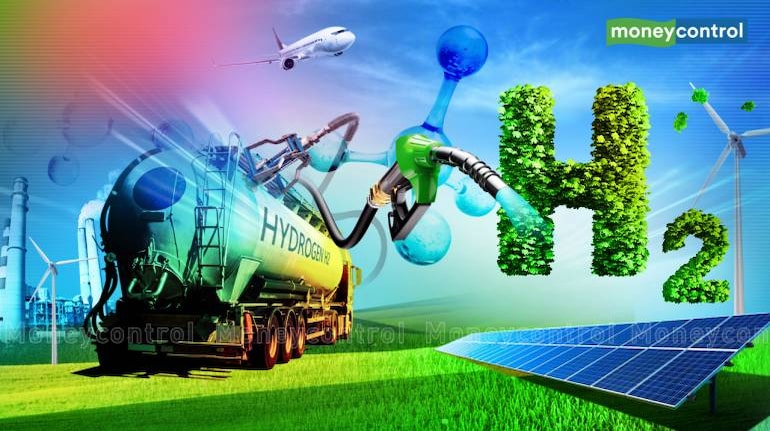
The recent announcement of the National Green Hydrogen Mission is a shot in the arm for India’s goal of achieving net carbon neutrality by 2070. Green hydrogen can play a critical role in sectoral decarbonisation, especially in hard-to-abate sectors such as such as refineries, steel and fertiliser industries.
With a massive financial outlay of Rs 19,744 crore, the Mission targets 5 million metric tonnes of green hydrogen production by 2030 – among the highest targets set globally. This would require an additional renewable energy capacity of at least 125 GW which is almost the entire current capacity of renewables in India.
Build Green Hydrogen Ecosystem
Achieving these targets will necessitate rapid scale-up of renewable projects within the next few years through allocations for infrastructure augmentation such as transmission networks and energy storage systems for renewable energy integration. Additionally, the government must look at focusing on demand creation measures to bolster consumption and pilot projects across different industries, like green steel, shipping, transport and railways.
Since the Mission also aims for India to become an exporter of green hydrogen and its derivatives such as ammonia, the Budget must consider allocations for the timely development of ports, hydrogen hubs and supporting storage infrastructure. A reduction in customs duties on electrolysers and critical minerals will also be imperative for scaling up green hydrogen production and export.
If implemented well, green hydrogen has the potential to generate over 600,000 green jobs by 2030, contributing significantly to India’s economic development. To strengthen this push, budgetary support for R&D in this nascent technology will be key – from enforcing safety standards to blending green hydrogen-based methanol/ethanol and other synthetic fuels in automobile fuels.
Incentives For EV batteries
The transport sector is responsible for about 10 percent of total greenhouse gas emissions in India, with road transport alone contributing to about 87 percent of the sectoral emissions. Considering this, Budget 2023 is also expected to bet big on electric vehicles (EVs) and its critical component – batteries. EV battery second-life applications, interoperability, reuse and recycling are some areas that need financial thrust.
In addition to the ongoing efforts to scale up battery manufacturing, the Budget should introduce measures to encourage standards and regulations for the safety and performance of EVs while promoting diversification of battery technologies and circular economy strategies such as battery reuse and recovery of critical minerals. A key Budget expectation is incentives and other support measures for the development of the lithium-ion recycling industry which can help reduce the impact of material criticality.
The government can encourage the creation of a robust reuse and recycling market to operationalise them at a large scale and at par with global standards. We expect the Budget to introduce incentives to improve the economic viability of recycling and introduce production-linked incentives (PLI) for these segments, which will help enhance the environmental benefits and raw material availability for the domestic manufacturing industry. Additionally, budgetary support for manufacturing battery active materials through a targeted PLI scheme for niche battery chemistries can further help in cost optimisation.
We expect more fiscal and non-fiscal incentive announcements to boost both the demand and supply sides. A GST reduction from 18 percent to 5 percent on packs and cells of Li-ion batteries and the inclusion of a phased battery standardisation plan in the battery swapping policy will also spur growth in this segment. Additionally, the Budget should incentivise charging infrastructure penetration across states to keep up with the anticipated rise in demand.
Prioritise Public Transport
Lastly, public transport – one of the highest impact areas for achieving a decarbonised economy – should be prioritised. While more than 890 million people are expected to live in cities by 2050, the modal share of public transport, especially buses, has plummeted. India has over 41,720 buses in cities with 500,000+ population – requiring almost 90,600 more buses for a desirable people-to-bus ratio of 50 buses per lakh population.
A budgetary support for the procurement of at least one lakh e-buses under an Opex model (amounting to Rs 62,500 crore) will enable the transition of public transit towards sustainable models. Additionally, the government should ensure that first and last mile connectivity solutions like rickshaws and autos, which are part of a largely disorganised segment, are included in this journey to ensure an equitable transition.
We hope for a budget that encourages a just transition to new technologies with a strong focus on job creation, reskilling and upskilling. Budget 2023-2024 will also be instrumental in enhancing the impact of India’s G20 Presidency by embracing the broader principles of transitioning to a cleaner and greener future under the theme “One Earth, One Family, One Future”.
Madhav Pai is interim CEO, WRI India and Executive Director, WRI India Ross Center for Sustainable Cities; Pawan Mulukutla is Director, Integrated Transport, Electric Mobility and Hydrogen, WRI India. Views are personal and they do not represent the stand of this publication.
Discover the latest Business News, Sensex, and Nifty updates. Obtain Personal Finance insights, tax queries, and expert opinions on Moneycontrol or download the Moneycontrol App to stay updated!
Find the best of Al News in one place, specially curated for you every weekend.
Stay on top of the latest tech trends and biggest startup news.